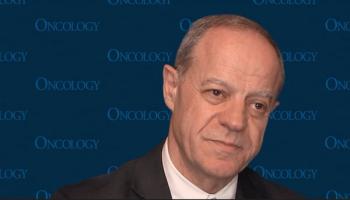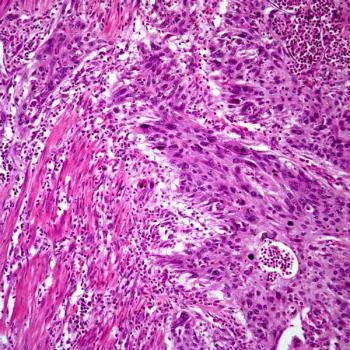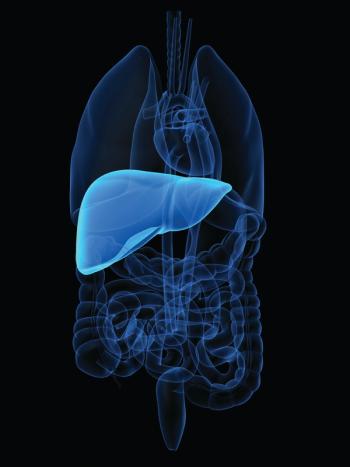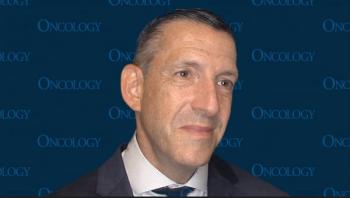
Whether CAR T-cell therapy or T-cell engagers should dominate the multiple myeloma landscape may be hard to determine, says David S. Siegel, MD.

Your AI-Trained Oncology Knowledge Connection!


Whether CAR T-cell therapy or T-cell engagers should dominate the multiple myeloma landscape may be hard to determine, says David S. Siegel, MD.

Most infection events among those with newly diagnosed multiple myeloma in the MajesTEC-7 trial appeared to occur early during study treatment.

Isatuximab, bortezomib, lenalidomide, and dexamethasone prolonged PFS vs bortezomib, lenalidomide, and dexamethasone, in a subsect of patients with multiple myeloma.

Next steps for research in the multiple myeloma space may include the development of novel CAR T-cell strategies and bispecific antibodies.

No patients with dMMR rectal cancer enrolled on a phase 2 study required subsequent chemotherapy or radiation following treatment with dostarlimab.

CheckMate 77T trial saw an EFS improvement with neoadjuvant nivolumab in stage III N2 and stage III non-N2 non–small cell lung cancer.

Phase 2 data support further evaluation of datopotamab deruxtecan in patients with non–small cell lung cancer and brain metastases.

Similar outcomes were noted when linvoseltamab and teclistamab were analyzed as treatments for patients with relapsed/refractory multiple myeloma.

The CheckMate 816 trial reinforced the EFS data of nivolumab plus chemotherapy in resectable NSCLC.

Patient-reported outcomes from the EV-302 trial found consistent efficacy and safety outcomes for patients with urothelial carcinoma.

Final DFS results from IMpower010 show consistent survival when adjuvant atezolizumab was used in stage IB to IIIA NSCLC.

The rate of subsequent anticancer therapy was reduced with darolutamide vs placebo in patients with mHSPC in the ARASENS trial.

Data support subcutaneous envafolimab plus lenvatinib as a promising new therapy option in advanced endometrial cancer.

KIM-1 was the most significantly enriched circulating protein in recurrence vs baseline serum samples among patients in the IMmotion010 trial.

Ongoing research may clarify the potential benefit of avelumab when administered in combination with other agents in advanced urothelial carcinoma.

Data suggest that those with relapsed/refractory multiple myeloma and poor functional status may benefit from talquetamab without increased toxicity.

Spatial analyses may help determine factors that influence responses to sacituzumab govitecan-containing regimens in urothelial carcinoma.

Eye-related adverse effects after treatment for relapsed/refractory multiple myeloma in DREAMM-7 appear manageable with dose and schedule changes.

Giving tocilizumab before step-up dosing of teclistamab may mitigate cytokine release syndrome in relapsed/refractory multiple myeloma.

Phase 2 data show that vaccination with PolyPEPI1018 may enhance the efficacy of atezolizumab in those with microsatellite stable metastatic CRC.

Responses occurred in patients with relapsed/refractory multiple myeloma who are refractory to daratumumab but received retreatment with the agent.

Less than half of the patients enrolled on cohort H of the EV-103 trial required subsequent anticancer therapy following enfortumab vedotin.

Limited efficacy was observed when sacituzumab govitecan was given after enfortumab vedodin in metastatic urothelial carcinoma.

Terence T. Sio, MD, MS, highlights advances such as proton beam radiotherapy that may improve outcomes for those with non–small cell lung cancer.

The median progression-free survival and overall survival was extended with rivoceranib among those with unresectable HCC in the CARES-310 trial.

Using the TILs CD8-positive, PD-1-positive, TIM3-negative, and LAG3-negative as predictive biomarkers did not impact outcomes in metastatic clear cell renal cell carcinoma.

The addition of liver transplant to chemotherapy in those with colorectal cancer and liver metastases boosted overall survival.

The safety profile of zanidatamab in the HERIZON-BTC-01 trial appears to remain consistent after longer follow-up.

Data from the EMBARK trial show no significant differences in sexual activity and urinary symptoms when suspending treatment with enzalutamide.

Adverse effects associated with oral azacitidine in low- or intermediate-risk MDS are typically transient, according to Mikkael A. Sekeres, MD, MS.